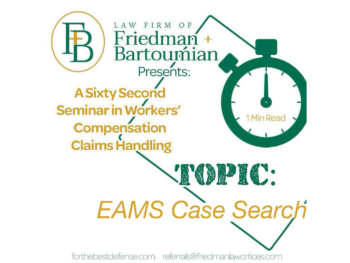We recently faced an interesting situation arising from a carrier’s failure to timely issue a decision in a case where compensability was being investigated. The decision was issued well beyond the limit allowed under Labor Code 5401(b)(1), which provides that once 90-days from submission of a DWC-1 Claim Form has elapsed without a decision, the injury in question is presumed compensable.
The claim involved a worker who was digging a ditch to install an underground pipe. While so doing the worker became winded and developed shortness of breath, and as a precaution the concerned employer drove the worker to an emergency room. Although it was feared that a heart attack was imminent the worker’s symptoms subsided after a few minutes. However, the ER doctors decided to run a full battery of tests which revealed a very weak and serious heart valve problem in need of surgery.
Ultimately, as noted above, the workers’ compensation claims administrator failed to issue a compensability decision within 90 days, and as such, the claim was presumed compensable. Thereafter, the claims supervisor instructed the handling adjuster to accept liability and set a hefty $450,000 reserve for a full-blown heart surgery claim.
The compliant adjuster then accepted liability but only for the injury described in the DWC-1 claim form, which was for “shortness of breath, as the claim for a defective heart valve was not mentioned in the form. Why was the foregoing of critical import? The fact that the heart condition was not mentioned in the DWC-1 form rendered it not subject to the 90-day deadline! Despite suspecting that the heart problem was pre-existing, the adjuster wisely realized there was a duty to continue investigating to determine if the need for surgery was attributed to or aggravated by the shortness of breath incident. Afterwards, the PTP agreed that the heart valve condition was pre-existing and non-industrial. The adjuster’s critical thinking not only saved the insurance company over $450,000 but the file was then closed at the cost of a simple ER visit along with the cost of the physician’s supplemental report.
The purpose of this story is to reinforce that even when liability for an injury is deemed admitted once the 90-day timeline under LC §5401(b)(1) expires, it does not mean the worker is entitled to carte blanche benefits. We here at Friedman + Bartoumian congratulate the adjuster for realizing that the 90-day rule only applied to injuries identified in the DWC-1 Claim Form and not to every medical condition raised or discovered afterwards!


Leave a Reply